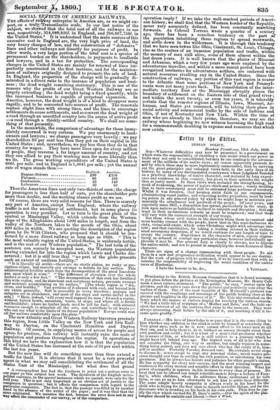Mentioning to the British Museum Committee that it is found
necessary to put glass before the pictures at the Kensington Museum, Mr. Henry Cole made a most curious statement. "The public," he says, "sneeze upon the pictures, and the saliva runs down the pictures and positively eats away the surface of them. One of the most valuable of Mr. Mulready's pictures was covered with the coughings and sneezings of the public looking close at the picture and laughing in the presence of it." Mr. Cole also remarked on the fancy which the masses of visitors display for touching the various objects. "We had a little bit of sculpture of a 'Mother and Babe,' and the babe ex- cited the interest of all the mothers that came to the museum. They were always measuring their babies by the side of it, and touching it till it be- came quite grubby."
EIRADAY.—His love of knowledge is so pure that it is the same thing to him whether any addition to the stock is made by himself or somebody, else. Very great men, such as he is now, cannot afford to let lesser men do all they can, and to help them to do it, without an uneasy thought about their own position and credit; but it is a test of a man's real greatness whether he is aware of this, or whether he is still subject to a jealousy which he might have left behind long ago. The highest man of all is he who does not consider the thing, one way or another, but simply rejoices in some- thing being gained, and does not care about who has the credit of it, him- self or another. Probably Faraday does not care. He certainly never stops to discuss it ; never stoops to urge any personal claim ; never wastes pre- cious thought and time in settling his own position, or calculating his own greatness. But he always has leisure and patience for other people's claims. He has sympathy for every new success, and the most winning respect and tenderness for every. modest and sensible effort in that direction. What his power of sympathy is appears in_his lectures to every class of persons. No treat that can be offered can tempt scientific men to forego a lecture of Fara- day's, while children, when he addresses them understand all he tells them, or can go up to him afterwards to ask him, to settle their difficulty. The same simple hearty sympathy is always ready in his heart for child who is trying for the brat time to discern invisible things, and for the discoverer who is treadino. on his heels in his own path. Thus does he jus- tify the view which excited Sir H. Davy's smile —that the spirit of the phi- loeopher should be amiable and liberal.—Once a' Week.


























 Previous page
Previous page